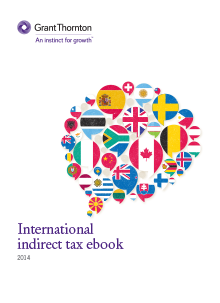-
Auditoría Interna
Servicios de Auditoría Interna. Nuestra firma, se especializa en servicios de auditoría interna utilizando metodologías bajo estándares internacionales.
-
Revisoría fiscal
Los servicios de Revisoría Fiscal de la Firma han sido diseñados para apoyarle a cumplir con los desafíos que implica el administrar riesgos, recursos e información.
-
Auditoría externa
Firma líder de Auditoría externa en Colombia, nuestro servicio tiene como objetivo expresar una opinión independiente en relación con la razonabilidad de los Estados Financieros de las empresas o ciertas áreas de negocios en cuyo caso utilizamos procedimientos previamente convenidos
-
Auditoría externa de gestión y resultados
Nuestro trabajo cosiste en la ejecución de procedimientos definidos para la revisión de la información contable y la emisión de los informes y documentos correspondientes.
-
Impuestos
Acompañamiento a nuestros clientes en todas las etapas necesarias para lograr un cierre fiscal exitoso, buscando optimizar el pago de los impuestos y aliviar la carga tributaria.
-
Precios de Transferencia y Atribución de Rentas
En Grant Thornton estamos preparados para que nuestros clientes encuentren asesoría completa, identificando la naturaleza de sus operaciones con vinculados en el exterior, con el fin de cumplir con los requisitos exigidos por la administración tributaria.
-
Servicios Legales
Firma líder en Servicios Legales en Colombia, contamos con expertos calificados y oficinas en las principales ciudades del país.
-
Diagnóstico e implementación de NIIF plenas y NIIF para las PYMES
Servicios de Diagnóstico e implementación de NIIF plenas y NIIF para las PYMES
-
Capacitación y actualización en NIIF
Servicios de Capacitación y actualización en NIIF
-
Cálculo de estimaciones contables bajo NIIF
Servicios de Cálculo de estimaciones contables bajo NIIF
-
Valoración de instrumentos financieros
Servicios de Valoración de instrumentos financieros
-
Asesoría en consultas especializadas
Servicios de Asesoría en consultas especializadas
-
Asesoría en NIIF para entidades del sector público
Servicios de Asesoría en NIIF para entidades del sector público
-
Preparación de estados financieros y revelaciones
Servicios de Preparación de estados financieros y revelaciones
-
Contabilidad financiera
Nuestro apoyo involucra el diseño de la organización contable con el fin de ajustar el mantenimiento de registros y presentación de informes a sus necesidades.
-
Servicios tributarios
Firma líder en servicios de Cumplimiento tributario y legal con expertos calificados y presencia en las principales ciudades de Colombia.
-
Integración de la Economía Circular el modelo productivo
Este servicio se enfoca en eliminar los residuos desde la etapa de diseño del producto o servicio, promoviendo la sustitución de materias primas y la implementación de programas internos de segregación.
-
Asesoramiento para la participación en el Programa Nacional de Cupos Transables de Emisión de Gases de Efecto Invernadero (PNCTE)
El Programa Nacional de Cupos Transables de Emisión (PNCTE) es una herramienta de mercado diseñada para regular y reducir las emisiones de gases de efecto invernadero en distintos sectores productivos.
-
Diseño de Planes de Gestión del Riesgo Climático
Diseñamos estrategias para ayudarte a enfrentar los riesgos del cambio climático con visión estratégica y alineada con la normativa vigente.
-
Estudio de viabilidad para proyectos de energías renovables
Servicios de Estudio de viabilidad para proyectos de energías renovables
-
Medición y compensación de huella de carbono corporativa
Conoce nuestros servicios de Medición y compensación de huella de carbono corporativa en Colombia. Ingresa ahora para más información.
-
Servicio de Protección de datos personales
Las leyes de tratamiento de datos personales y habeas data establecidas en el país buscan la vinculación con normas internacionales como el GDPR. Estas normas, están definidas para todas las compañías que captan, almacenan y procesan datos personales, independientemente de su segmento operativo, tamaño o volumen de negocio.
-
Servicio de Respuesta a incidentes
Ayudamos a los clientes a trabajar junto con sus equipos legales y de TI para brindar una investigación y remediación coordinada, oportuna y eficiente a los eventos que han derivado producto de las vulnerabilidades cibernéticas.
-
Pruebas de rendimiento
Nuestro servicio se enfoca en determinar la rapidez en la cual se realiza una tarea en condiciones particulares de trabajo sobre un sistema de información o aplicación específico.
-
Seguridad informática
La ciberseguridad enmarca un conjunto de herramientas, políticas, salvaguardas de seguridad, directrices, métodos de gestión de riesgos, acciones, formación y en resumen una serie de prácticas que pueden utilizarse para proteger los activos de la organización y los usuarios en el ciberentorno.
-
Auditoria de TI
Los servicios de auditoría de TI ayudan a la Organización a gestionar los riesgos y controles relacionados con la implementación y el uso de TI para el logro de los objetivos financieros, operativos y regulatorios del negocio.

-
Inteligencia y análisis de negocios
La inteligencia de negocio actúa como un factor estratégico para una organización, generando una potencial ventaja competitiva, que no es otra que proporcionar información privilegiada para responder a los problemas de negocio.
-
Gestión del cambio
La gestión del cambio es el proceso, que a través de herramientas y técnicas, permite gestionar la transición hacia una nueva realidad, intentando que las personas involucradas sean capaces y deseen trabajar en el nuevo contexto definido y se consigan los resultados esperados.
-
Mejora operacional
La gestión por procesos, dentro de la cual se enmarca la mejora operacional, puede definirse como una forma de enfocar el trabajo, donde se busca el mejoramiento continuo de las actividades de una organización mediante la identificación, selección, descripción, documentación y mejora continua de los procesos.
-
Gestión del riesgo y gobernanza
Optimiza la gestión de riesgos empresariales con soluciones en gobernanza, control interno y continuidad de negocio. Aumenta la efectividad y sostenibilidad de tu empresa.
-
Riesgo Financiero y Modelamiento
Descubre cómo optimizar la gestión de riesgos financieros con nuestras soluciones en modelamiento, liquidez, mercado y crédito. Consultoría especializada para empresas.
-
Servicios especiales
Proporcionamos informes objetivos independientes sobre el diseño, la implementación y la eficacia operativa de los controles en las organizaciones de servicios (relacionados con informes estratégicos, operativos, tecnológicos y riesgos de cumplimiento), de conformidad con cualquier estándar de certificación que no sean los estados financieros típicos, por ejemplo, de conformidad con el Estándar de Certificación AICPA o el Estándar Internacional para el Compromiso de Certificación (ISAE).
-
Servicios de auditoría interna
Las compañías administran sus riesgos bajo la premisa de control interno para minimizar su exposición sobre estos. Esto conlleva a omitir la correcta verificación frente al diseño y funcionamiento adecuado de los controles relacionados con la información financiera, al ser estos, omitidos en su verificación desde la perspectiva de integridad al no estar correctamente monitoreados.
-
Control interno
El Control Interno fomenta la eficiencia de los procesos en la administración garantizando la confiabilidad de la información financiera y el cumplimiento de leyes y normas vigentes; reduce el riesgo de pérdida de valor de los activos dentro de las compañías.
-
Tecnología forense
Nuestro laboratorio forense se encuentra ubicado en Brasil y da cobertura a nivel Latinoamérica, mediante este garantizamos la agilidad, eficiencia y seguridad de nuestras investigaciones.
-
Inteligencia corporativa
Disponemos de herramientas de alcance mundial y de un equipo de especialistas capacitados para buscar, correlacionar y ampliar el alcance de la información, brindándole a su compañía una visión global frente a su relacionamiento empresarial, logrando con esto brindar una mayor orientación facilitando el relacionamiento.
-
Sistema de administración del riesgo de lavado de activos
Verifica los elementos de la administración del riesgo de Lavado de Activos, Financiación del Terrorismo y los riesgos asociados, la identificación de los riesgos inherente y residual en cada uno de los factores de riesgo de acuerdo con lo estipulado en las normas emitidas por las Entidades de Vigilancia y Control.
-
Programa de transparencia y ética empresarial, Programa anticorrupción, Programa antisoborno o códigos de conducta/ética
La evolución de las compañías y el crecimiento empresarial han llevado a que el mercado sea dinámico, producto de esto, se hace necesario la generación de lineamientos y conductas a ser cumplidas para prever situaciones atípicas o que puedan afectar su buen nombre.
-
Due Diligence
La diligencia debida o Due Diligence es un término, utilizado habitualmente en el ámbito de las adquisiciones empresariales, para referirse al proceso de búsqueda de información sobre una organización.
-
Valoraciones
La valoración de una empresa no es una ciencia exacta y puede variar en función del tipo de negocio y el motivo.
As more and more goods and services are crossing national borders than ever before, and with indirect taxes being adopted by a growing number of tax authorities, international businesses are facing tax issues in many overseas countries - including the possibility of having to account for tax in the country where their customer is located.
Those businesses face a significant challenge because of the nature of indirect taxes, and the way in which the rules are applied locally as these can vary significantly from country to country - even between countries that are supposed to apply them in the same way. Those differences make understanding and complying with the requirements a complicated and time consuming task.
However, one thing that all indirect taxes do have in common is the fact that they are transaction based. That means that they need to be considered at an early stage, if unexpected liabilities and unnecessary costs are to be avoided.
This international indirect tax guide provides an overview of the different indirect tax rules and regulations in a number of countries and details of how you can get further advice from Grant Thornton specialists who can help with:
Identifying where transactions are taxed - indirect taxes have special rules that determine the time and place where a transaction is taxed. Sometimes that means the taxation occurs in the country where the
supplier belongs, and in other cases where the customers belongs.
Registration - a business may need to register for the local indirect tax in countries where it is deemed to be undertaking taxable transactions. Registration may still be necessary even if it does not have any conventional or obvious business presence in the country concerned.
Planning for transactions - the indirect tax implications of reorganisations, acquisitions, and the disposals of overseas businesses need to be considered at the planning stage to ensure that they are undertaken in the most tax efficient manner.
Compliance - using expert local knowledge to assist you with the preparation and submission of the indirect tax returns, and advise on when any tax liability has to be paid.


